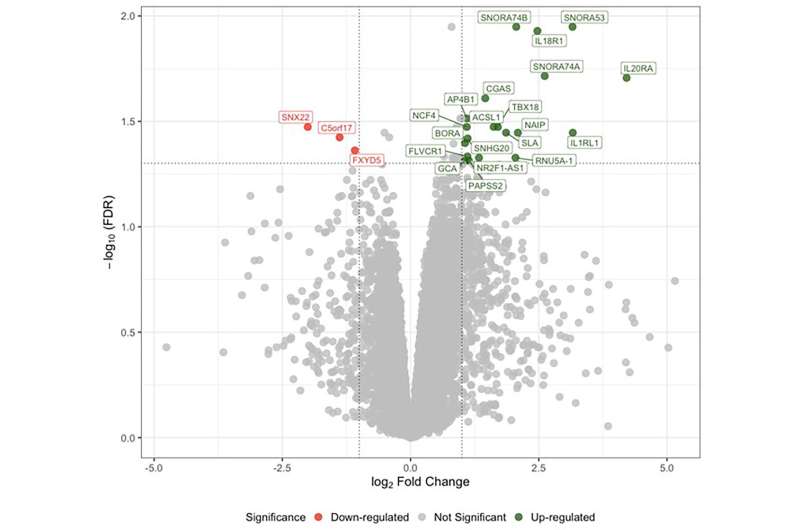Emergency cesarean causes inflammatory response

Labor and natural childbirth cause stress on a mother's body but an emergency Cesarean is associated with even more inflammatory gene expression in the placenta, new South Australian research shows.
The study, led by Flinders University's Pregnancy Health and Beyond (PHaB) Lab and other researchers, investigated differences in placenta inflammation markers after delivery of both male and female babies involved in 20 emergency Cesarean procedures—compared with 40 placentas from vaginal (or "natural") deliveries and 10 placentas from an elective C-section at an Adelaide public maternity hospital between 2006 and 2018.
"Labor is an inherently inflammatory process, so if you have a planned or pre-labor Cesarean section there will be less inflammasome activation than seen in an emergency C-section in a woman already in labor or in an unassisted vaginal birth," says Dr. Anya Arthurs, the lead author of a new article in Frontiers of Immunology.
"In births where labor is involved, there is more inflammatory gene expression in the placenta if you had an emergency Cesarean section compared to a vaginal birth.
"This study also indicates that babies, in particular females, could be more compromised in their development and long-term health and well-being after an emergency C-section."
"Interestingly, while placentas tested from baby boys have more inflammatory gene expression from a vaginal or 'natural' birth, baby girls born in emergency Cesarean section deliveries have more inflammatory markers," says senior author Matthew Flinders Professor Claire Roberts, from the Flinders Health and Medical Research Institute.
"One explanation for this could be our finding that placentas from baby boys tend to put out 'alarm signals' (known as 'interleukin-33') in times of fetal distress, which we didn't see in the placentas from baby girls. This could help to mitigate the amount of inflammation." Overall, assessment of inflammatory gene expression in the placenta could be used to identify babies who have been exposed to higher-than-normal levels of inflammation at birth, and so create incentives to monitor their development and long-term health and well-being more closely, the researchers conclude.
The article, "Placental inflammasome mRNA levels differ by mode of delivery and fetal sex," has been published in Frontiers of Immunology.
More information: Anya L. Arthurs et al, Placental Inflammasome mRNA Levels Differ by Mode of Delivery and Fetal Sex, Frontiers in Immunology (2022). DOI: 10.3389/fimmu.2022.807750





















